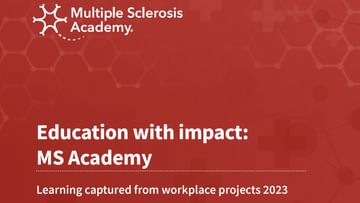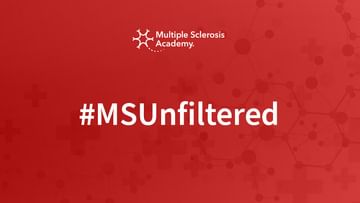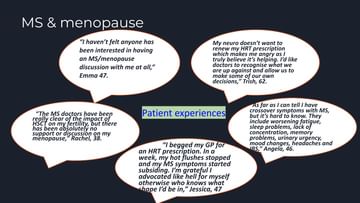Variance in the provision of MS Nurse Specialists
At the multiple sclerosis (MS) service variance event on the 2nd November, David Martin, CEO of the MS Trust, began his talk with an apology. ‘This brilliant report has been buried on the MS Trust website,’ he said. David was speaking to the room on the variance in provision of MS specialist nurses, and the report he refers to is ‘The MS Forward View’ (2016).The report is an in-depth evaluation of the picture of MS services in 2016 from both a qualitative and quantitative standpoint, and subsequent series of recommendations to follow if we are to deliver a reasonable service to people living with MS in the future. At the Way Forward event, we heard repeatedly the clear mandate ‘we need to do things differently’, and the report evaluates the situation in the same way. Looking forward at the future of MS in the UK, David highlighted the report’s statement that Fig 1: MS Trust – Variance in MS service provision (2018)[/caption]Despite this proven benefit, many people living with MS are assigned to a nurse who already has an unsustainable caseload (fig 1).
Fig 1: MS Trust – Variance in MS service provision (2018)[/caption]Despite this proven benefit, many people living with MS are assigned to a nurse who already has an unsustainable caseload (fig 1). Number 1, was ‘more MS nurses’. Unsurprising, particularly when he had already noted that 66 post shortfall in the UK calculated, but their placement was detailed too. Quoting another MS Trust report released at the same time as ‘The MS Forward View’, David placed an emphasis on more community-based specialist nurses who are better able to support those with advancing MS, and are less likely to manage travel to hospitals or clinics to receive the nurse-led support they need.Linking well with recommendation 5, ‘to have Advanced MS champions to support and manage people’s care as it becomes both more complex, and necessitates care increasingly close to, or at, home. The report, ‘Improving services for people with advanced MS’ (2016) noted ‘Vital symptom management and [multidisciplinary team] MDT services are patchy or unavailable in many parts of the UK with more than half of all patients reporting problems in accessing the support and services that they need.’Recommendations 2 and 3 were met with varied appreciation from the room: widespread nurse prescribers and more nurses ordering MRIs would, David shared, increase the efficiency and timeliness of disease-modifying treatment reviews and onward referrals. Nurse prescribers in attendance, however, noted the challenges they face both practically, in covering their own personal liability insurance – which is not paid for by their Trusts as it is for other professionals, to their time being taken up increasingly with administration related to these tasks rather than personal support direct to people with MS. Sarah White, MS Specialist Nurse at St Georges, succinctly put it that:
Number 1, was ‘more MS nurses’. Unsurprising, particularly when he had already noted that 66 post shortfall in the UK calculated, but their placement was detailed too. Quoting another MS Trust report released at the same time as ‘The MS Forward View’, David placed an emphasis on more community-based specialist nurses who are better able to support those with advancing MS, and are less likely to manage travel to hospitals or clinics to receive the nurse-led support they need.Linking well with recommendation 5, ‘to have Advanced MS champions to support and manage people’s care as it becomes both more complex, and necessitates care increasingly close to, or at, home. The report, ‘Improving services for people with advanced MS’ (2016) noted ‘Vital symptom management and [multidisciplinary team] MDT services are patchy or unavailable in many parts of the UK with more than half of all patients reporting problems in accessing the support and services that they need.’Recommendations 2 and 3 were met with varied appreciation from the room: widespread nurse prescribers and more nurses ordering MRIs would, David shared, increase the efficiency and timeliness of disease-modifying treatment reviews and onward referrals. Nurse prescribers in attendance, however, noted the challenges they face both practically, in covering their own personal liability insurance – which is not paid for by their Trusts as it is for other professionals, to their time being taken up increasingly with administration related to these tasks rather than personal support direct to people with MS. Sarah White, MS Specialist Nurse at St Georges, succinctly put it that:
‘the increase in workload will be challenging, if not impossible, for us to do unless we work differently’.
Specialist nurse provision: the reality
So many people living with MS refer to their specialist nurse as their key contact, yet David highlighted that the variance in access to a specialist nurse is worsening year on year, despite the physical numbers of specialist nurses having risen slightly. The increase in numbers of MS nurses has not been rapid enough to counteract the already overburdened caseloads of existing nurse specialists alongside the increase in the number of people with MS.Every MS specialist nurse saves the NHS an estimated £77,000 through reductions in GP appointments, time in A&E, numbers of hospital admissions and length of stay for patients, the room heard from David. The number of reports detailing evidence in support of specialist nurses are numerous, not just within MS but in Parkinson’s, epilepsy, and non-neurological conditions like cancer too.[caption id="attachment_3803" align="alignleft" width="300"] Fig 1: MS Trust – Variance in MS service provision (2018)[/caption]Despite this proven benefit, many people living with MS are assigned to a nurse who already has an unsustainable caseload (fig 1).
Fig 1: MS Trust – Variance in MS service provision (2018)[/caption]Despite this proven benefit, many people living with MS are assigned to a nurse who already has an unsustainable caseload (fig 1).‘7 in every 10 people are living in areas where their MS nurses’ caseloads are in excess of a sustainable caseload figure’ announced David.This sustainable number has been calculated as ‘358’ according to the MS Trust’s brand new report ‘MS Specialist Nursing in the UK 2018: Results from the 2018 MS Trust Nurse Mapping Survey’ (Oct 2018). The MS Trust is funding more nurses every year but the estimated UK shortfall is of 66 nurse posts, and this cannot be plugged solely by charitable provision.As we heard from the audience at the end of David’s talk, when considering this information alongside the increase in variety and uptake of disease modifying treatments (DMTs) and the level of monitoring required for these treatments (which is often carried out by specialist nurses), the amount of responsive or holistic care able to be offered is decreasing rapidly. However, as one specialist nurse in the audience put it,
‘We are overwhelmed, but we know there’s a need to look at the person as a whole and we need to hold onto the ‘specialism’ of being a specialist nurse. We’ve lost a little of that but I feel we can get it back.’
Improving services the MS Trust way
There are eight recommendations set out in the MS Trust’s report ‘The MS Forward View’ and David set about sharing these with the room. Number 1, was ‘more MS nurses’. Unsurprising, particularly when he had already noted that 66 post shortfall in the UK calculated, but their placement was detailed too. Quoting another MS Trust report released at the same time as ‘The MS Forward View’, David placed an emphasis on more community-based specialist nurses who are better able to support those with advancing MS, and are less likely to manage travel to hospitals or clinics to receive the nurse-led support they need.Linking well with recommendation 5, ‘to have Advanced MS champions to support and manage people’s care as it becomes both more complex, and necessitates care increasingly close to, or at, home. The report, ‘Improving services for people with advanced MS’ (2016) noted ‘Vital symptom management and [multidisciplinary team] MDT services are patchy or unavailable in many parts of the UK with more than half of all patients reporting problems in accessing the support and services that they need.’Recommendations 2 and 3 were met with varied appreciation from the room: widespread nurse prescribers and more nurses ordering MRIs would, David shared, increase the efficiency and timeliness of disease-modifying treatment reviews and onward referrals. Nurse prescribers in attendance, however, noted the challenges they face both practically, in covering their own personal liability insurance – which is not paid for by their Trusts as it is for other professionals, to their time being taken up increasingly with administration related to these tasks rather than personal support direct to people with MS. Sarah White, MS Specialist Nurse at St Georges, succinctly put it that:
Number 1, was ‘more MS nurses’. Unsurprising, particularly when he had already noted that 66 post shortfall in the UK calculated, but their placement was detailed too. Quoting another MS Trust report released at the same time as ‘The MS Forward View’, David placed an emphasis on more community-based specialist nurses who are better able to support those with advancing MS, and are less likely to manage travel to hospitals or clinics to receive the nurse-led support they need.Linking well with recommendation 5, ‘to have Advanced MS champions to support and manage people’s care as it becomes both more complex, and necessitates care increasingly close to, or at, home. The report, ‘Improving services for people with advanced MS’ (2016) noted ‘Vital symptom management and [multidisciplinary team] MDT services are patchy or unavailable in many parts of the UK with more than half of all patients reporting problems in accessing the support and services that they need.’Recommendations 2 and 3 were met with varied appreciation from the room: widespread nurse prescribers and more nurses ordering MRIs would, David shared, increase the efficiency and timeliness of disease-modifying treatment reviews and onward referrals. Nurse prescribers in attendance, however, noted the challenges they face both practically, in covering their own personal liability insurance – which is not paid for by their Trusts as it is for other professionals, to their time being taken up increasingly with administration related to these tasks rather than personal support direct to people with MS. Sarah White, MS Specialist Nurse at St Georges, succinctly put it that:‘there’s a lot of value in being really responsive [to patient’s needs] but sitting and ordering scans and signing prescriptions takes a lot of that away. We need to use the skills we have wisely.’Some of these concerns would be taken care of with recommendation number 4: ‘to have a non-clinical DMT coordinator within every MS team to manage the administration and coordination of treatments, and a DMT nurse to carry out reviews, monitoring and reviewing of blood panels, freeing up specialist nurses to manage the more specialist elements of the work and to be upskilled to, in turn, take some of the burden from neurologists.Number 6, ‘to hold less face to face meetings’ could also respond to the room’s concerns. Whilst this might initially sound as another area where personal patient contact is reduced, David pointed out that it would serve for where appointments are for routine blood tests or prescribing or monitoring appointments where a lack of nurse or neurologist would not compromise safety. The 2016 report found that, at the time, ‘only 32 out of 148 prescribing and monitoring centres are able to schedule blood tests without a need for a nurse or neurologist appointment’. Citing a real need to share best practice and to learn from each other, David pointed out that St George’s have a virtual DMT monitoring clinic to allow for less face to face meetings where they are not really needed – which therefore frees up space for more appointments where personal interaction really is needed.Number 7 and 8 both look at information: ‘a better use of data’ and ‘better sharing of best practice’. At the time of the report, just two years ago, ‘only 28 out of 107 centres use an IT system or database to track DMT monitoring.’ Highlighting the problems with reliance on a white board that can so easily be tampered with or accidentally erased, the MS Trust CEO noted recommendation 8 as an example of 7. ‘Salford has a system that does this. We can learn from them, Let’s not reinvent the wheel.’

Practical challenges
The room largely agreed with much that David was saying and the clear, practical steps to improving care were well supported - not only by the MS Trust’s 2016 research – but by many other speakers during the two-day conference. The challenge, though, is to put the learning into practice without creating other shortfalls.A number of the specialist nurses attending shared their support, in theory, for specialist nurses to have more autonomy around prescribing and referrals, yet highlighted the difficulties in administrative duties taking away from the specialist care that their vocation calls for. Additionally, both the types of services on offer, and the way they are delivered, is changing with more and more disease-modifying treatments available to help mange MS, and one attendee pointed out that the increase in DMT use and the monitoring associated has meant a change in roles and responsibilities for staff over the past few years. ‘Do the numbers really reflect the reality?’ they asked David. ‘I feel there’s so much monitoring that the ability to care has almost disappeared.’The answer cannot only be to add more nurses into the workforce, either, as one nurse shared from the audience. ‘A difficulty we have is that the more nurses we have will be absorbed through the DMTs which leaves those with more advanced MS or those who can’t get to hospital alone.’ They posed an unanswered question:‘Is there a way we can get nurses specifically into the community to support those who are outside of a hospital setting?’It is clear that the responsibilities of the MS nurse, already overstretched in the majority of cases – cannot be asked to change in isolation. For the role to expand to cover more prescribing responsibilities, there must be liability cover built in to their staff costs and more administrative support to ensure they still have time for the individual care they are so valued for. In the new treatment landscape, DMT monitoring must be planned for and funded – as we heard from Rachel Dorsey-Campbell in her talk on the true cost of DMTs. Dedicated staff who are trained to specialise in DMTs and their administration and monitoring was one idea presented, perhaps overseen by specialist nurses.Another suggestion came from one of the pharmacists in the room: ‘I’d like to add a number 9 to your list,’ he began. ‘Use your pharmacist! A lot of us really want to be involved, we want to be part of the team, and we can really help.’ The role of the pharmacist is one that came up in Rachel’s talk too, and the Neurology Academy has recently launched its first Neuropharmacist MasterClass, in recognition of the existing and often untapped skillset already in place within Trusts, as well as the need to ensure there is practically applicable education available for those pharmacists who want to better equip themselves to support neurology teams through their prescribing and monitoring.David’s presentation was clear and succinct in the areas of change required, but as with much of what was heard at ‘the Way Forward’ event, it is not as simple to put into place as it might seem. The implications to improve care for people with MS through their MS nurses reach far wider than the MS nurse role itself. Finally, and perhaps most simply, it seemed evident throughout this session that for our nurses to better support their patients, we must better support our nurses.
Watch this presentation:
https://youtu.be/-1bMSD3XLTc → More videos from this eventListen to this presentation:
→ More podcasts from this eventMore information
- Find out more about the MS Trust on their website.
- Read the MS Trust’s report ‘The MS Forward View’ (pdf)
- Read the MS Trust’s report, ‘Improving services for people with advanced MS’ (pdf)
- Find out more about St George’s virtual DMT monitoring clinic
- Learn more about Salford’s MS practice from David Rog, in his talk on the multidisciplinary team meeting
- Read the Spotlight article on DMT monitoring and the true cost of good care
- More spotlight articles for an in-depth look at some of the key issues raised at the Variance event
- Register for our follow-up meeting 2019: MS Service Provision in the UK 2019; Raising the Bar
Related articles
Encouraging excellence, developing leaders, inspiring change
MS Academy was established five years ago and in that time has accomplished a huge amount. The six different levels of specialist MS training are dedicated to case-based learning and practical application of cutting edge research. Home to national programme Raising the Bar and the fantastic workstream content it is producing, this is an exciting Academy to belong to.


